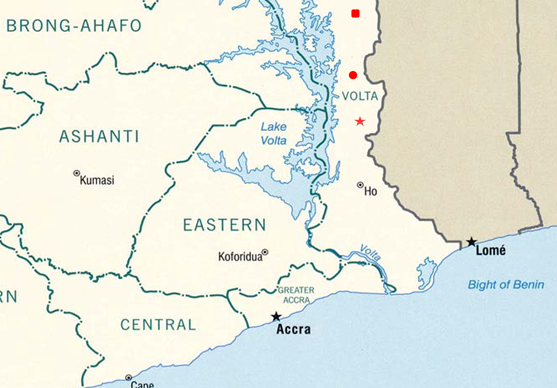Industrial Plantation
Volta Red operates two plantations in the Oti Region. In 2012, we acquired the lease on the Ata Kofi estate, which comprises 41ha of mature palms planted in 2007 under the Presendent’s Special Iniativer(PSI) scheme. In late 2013 we acquired the Brewaniaese estate which is made up of 3,750ha of land, of which 2,050ha are under cultivation.
Plantation sites
- Ata Kofi Estate – 41 ha of mature palms
- Brewaniase Estate – 3,750 ha of land (2,050 ha planted).

Ata Kofi estate
Established in 2006 and 2007 by a Ghanaian resident of Accra, this plantation was initiated under the President’s Special Initiative for Oil Palm. Encompassing 41 hectares of mature oil palm, the plantation faced neglect as the owner abandoned it due to challenges in finding a market for the fruit. Subsequently, extensive rehabilitation efforts have been undertaken, and the plantation is now fully restored and in robust fruit production.
Brewaniase estate
Spanning across 3,750 hectares, this estate underwent strategic planting over three years, with 800 hectares in 2010, another 800 hectares in 2011, and a final 500 hectares in 2012. Notably, all planting activities, except for the PSI land, adhered to the rigorous standards of the Roundtable on Sustainable Palm Oil (RSPO) New Planting Procedures (NPP). As the sole large-scale oil palm plantation in both the Volta and Oti Regions, our acquisition of this estate signifies a substantial multi-million Dollar investment in shaping the future of oil palm cultivation in the region.
Outgrower Scheme
Beyond our own plantations, Volta Red places paramount importance on fostering a robust Out-Grower program. This initiative is not only geared towards unlocking the potential of local farmers but also towards actively contributing to the economic development of Ghana. Identifying 500 individual farmers managing 2,000 hectares of smallholder oil palm plantings in the vicinity of our mill and estates, the company is committed to supporting those who planted palms under Ghana’s President’s Special Initiative on Oil Palm Plantings.
Initiated by the Government of Ghana, this program aimed to empower smallholder farmers by promoting economic development and reducing the country’s dependence on imports. However, as these farmers’ palms began to yield fruit, the absence of a commercial mill left them with a significant challenge. Consequently, surplus Fresh Fruit Bunches (FFB) beyond what local manual small-scale millers could process went to waste.
Since Volta Red’s presence in the region, the company has played a pivotal role in providing a market for these farmers, ensuring that their efforts do not go in vain. Additionally, we extend support by supplying high-quality oil palm seedlings and offering technical assistance, contributing to the overall success and sustainability of the Out-Grower program.
Expanding Reach
With past support from Solidaridad, Volta Red dedicated time and resources to improving outgrower farms and increasing their yields. Initially, yields were less than 3 tonnes of FFB per hectare. Through structured palm management, the aim was to at least double these yields over 1-2 years.
To achieve this goal, Volta Red collaborated with Solidaridad, an international organization with over 25 years of experience in creating fair and sustainable supply chains from producer to consumer (http://www.solidaridadnetwork.org/supply-chains/palm-oil).
Solidaridad introduced Best Management Practice (BMP) to oil palm outgrowers in Ghana, teaching them how to increase yields by managing their farms consistently and structuredly. The program ran for two years, witnessing remarkable successes. Some individual outgrowers experienced yield increases to over 6 tonnes per hectare, with one exceptional case reaching 15 tonnes per hectare.
Long term development plan
Once participating smallholders grasp the benefits of best practices, such as increases in yields and revenues, Volta Red will collaborate with them to encourage expanding the size of their farms. The company has already distributed several thousand seedlings and provided guidance on planting, management, and maintenance during the vulnerable early stages, when they are susceptible to disease, drought, insects, and rodents. Developing and expanding the outgrower program will remain a constant and ongoing process.